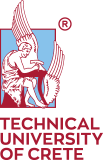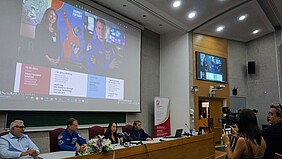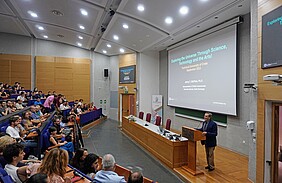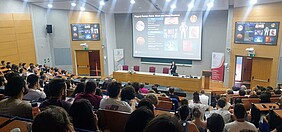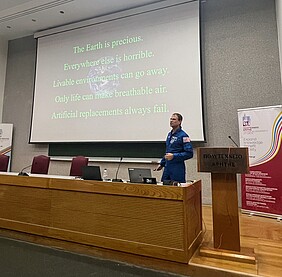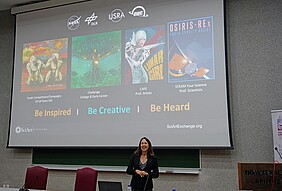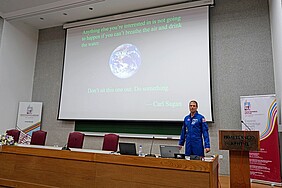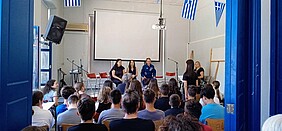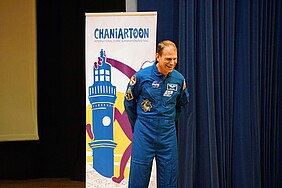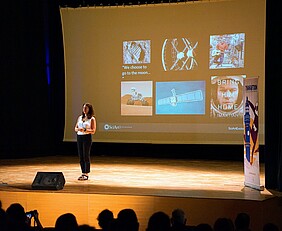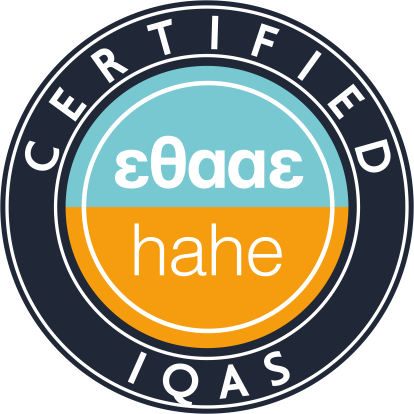A NASA astronaut and a neuroscientist specializing in space sciences kindled the enthusiasm of the academic and wider community of Chania, ascribing new dimensions to the vision of space exploration but also to the immediate need for the safeguarding of our planet in all possible ways.
On September 11th, 12th and 13th 2023, the Technical University of Crete had the honor of welcoming in Chania two distinguished scientists, NASA Astronaut Dr. Stanley G. Love and neuroscientist, space life scientist, and Executive Director of SciArt Exchange, Dr. Jancy McPhee.
The visit marked the beginning of the new academic year 2023-24 with a series of events for the scientific community as well as for the broader community of Chania, in the fields of education, technology and culture, with the active participation of the two leading scientists who have made a significant contribution to humanity's space exploration efforts and, through it, to the better understanding of human nature and planet Earth.
The key objective is to strengthen the university’s outreach
"It is very important for us to present to our invited scientists the cutting-edge technology produced in the Technical University of Crete laboratories and, moreover, its wider application in society." According to the Rector of the Technical University of Crete (TUC), Professor Michalis Zervakis, "the main objective of the visit is to enhance TUC’s outreach and connections with international, high-impact organizations." The second objective is linked to TUC’s ongoing effort "to educate its students and inspire a vision that extends beyond the usual ones associated with engineering sciences. We are closer than one might think to a professional involvement in astrophysics, aerospace and space sciences with organizations such as NASA and ESA."
Space exploration enthusiasm spans all sciences and all ages
The TUC Vice-rector for Research and Innovation Professor Konstantinos-Alketas Oungrinis referred to the TUC laboratories that research relevant topics in areas such as biomedicine and neuroscience, the environment, circular economy and the quality of life, satellites, signal processing, and so on. "The aim of this visit is to multiply connections and collaborations and to inspire researchers and students to engage in the future with areas that will bring results of mutual benefit for Earth as well as for beyond Low-Earth Orbit conditions."
Cuting-edge research at the Technical University of Crete has a future in space exploration
On the first day of their visit, Dr. Love and Dr. McPhee toured twelve TUC research laboratories across all five of the University schools. They watched presentations and interacted with project demo’s while talking to professors, researchers and students about the prospect of linking their work with international projects and organizations active in space exploration.
It is the responsibility of the scientists and the engineers to know why what they're doing is important because in this world we are bringing together teams from many different countries and backgrounds to solve the hardest problems in space and also on Earth, as we've been discussing very crucial matters like climate change. And so we need to be able to talk to each other.
Dr Mcphee commented that it is crucial to bring together teams from many different countries and backgrounds to solve the hardest problems in space and also on Earth. “We need to be able to speak each other's languages and we also need to talk to the public. We actually have to convince the general public that the work that we are doing is important and it's important to them, not just to us.”
Dr Love spoke enthusiastically about the range and the quality of the TUC research projects, adding that "we always look forward to going to new places and especially in a university, a technical university, where people are learning to be scientists and engineers, to let them know that there is room in space for all kinds of people. And it takes all kinds of people to make a space station happen.”
Space has the effect of making us feel like one family as human beings on earth
On Tuesday, September 12th, inside a packed “Manousos Manousakis” Auditorium, the invited speakers captivated everyone’s attention with a single message: There is room for everyone in space exploration.
In her talk titled “Exploring the Universe through Science, Technology, and the Arts”, Dr. McPhee initially discussed the exciting scientific and technological developments in space exploration, highlighting the challenges and the benefits of space exploration to humanity and life on Earth. She briefly then presented current discoveries and their past and future value to humanity in the following areas: observation (of weather and monitoring climate change), communication, economic development, education, international cooperation and sociopolitical evolution (Artemis Accords), spinoff technologies, scientific advances and planetary protection. She also referred to the five space hazards in human spaceflight and talked about how those hazards need to be addressed in the visionary missions planned for the future. “Each one of us can play a role in the future of space”, Dr. McPhee emphatically mentioned. Then, drawing on her own experiences, she stressed the enormous importance of working on the synergy between art, science and technology when trying to solve critical problems in space. She described one by one the tools art can offer in all scientific fields, such as communication and storytelling, creativity, collaboration, and the STEM, or better STEAM, approach. “We need to have educational programs that are also allowing students to study not just engineering and science but also the arts, and in turn to encourage the arts programs to explore questions that are related to science and technology.” Closing, Dr. McPhee summarized her 12 years of experience in the creation and development of her non-profit organization titled SciArt Exchange, which to date has activated more than 15,000 participants in 68 countries, and over 4.5 million people around the world have seen multi-media artworks and performances in person.
Dr. Love’s lecture, titled “A Special Place in Space”, focused upon an environmental approach to space exploration. Initially he discussed the emotional connection with the Earth that many space travelers experience when seeing our planet from outside the atmosphere, the realization that borders are not visible from space and the fact that "we are all in this together." He pointed out that some astronauts get so affected by this view that they become very active environmental advocates right after. He then revealed how his personal story was full of love for the environment right from the beginning, before he became an astronaut, thanks to his parents and Carl Sagan, a fact that led him to specialize in planetary science and the study of celestial bodies. Dr. Love continued his talk, guiding the audience through a journey to our solar system where he compared Earth to thirteen planets and their largest satellites in terms of atmosphere, gravity, temperature and their inability to support human life, concluding into how unique Earth really is. Regarding the cost of space research and exploration, Dr Love emphasized that “everything we know about the earth as a planet, and everything that we know about the planets of our solar system, and everything that we know about the universe came from space funding. Without that funding, we would have none of that knowledge and none of that understanding.” Closing, Dr. Love addressed the students in the audience emphasizing how essential each individual's contribution can be in protecting our planet's air and water. “You are in the right place if you want to make a career in space,” he stressed, urging them to think of creative solutions to address the continuing needs for new equipment that can support human life in space.
Interdisciplinarity as a tool in university research
On Wednesday the 13th, during the morning session, the invited scientists met with the Technical University of Crete team who participates and runs locally the European university alliance EURECA-PRO (European University on Responsible Consumption and Production). They offered valuable feedback on the coordination and the activities of this innovative project while discussing experiences and international good practice examples that can help strengthen it.
The students of the 1st Experimental Junior-High School of Chania have a Q&A session with an astronaut
One of the objectives of this visit, as planned by the Technical University of Crete, was to reach the wider public of Chania. In this context, Dr. McPhee and Dr. Love visited the 1st Experimental Junior-High School of Chania and traveled through space together with 33 students, aged 14-15 years old, and their teachers. They both answered the questions with directness and humor, talking about the challenges of human spaceflight, the power of collaboration and creative thinking, the career requirements in this field, the value of pursuing one's dream and how seeing the Earth from above changes one’s perception of the world and the borders of nations. "I love visiting schools and places where people don't have anything to do with space or think about it. It gives me the opportunity to share my excitement and my joy about what's going on out there" Dr. Love commented.
Space inspires and gets inspired by art
During the last event that was scheduled for this visit, Dr. McPhee and Dr. Love were the invited speakers at the 7th International Comic and Animation Chaniartoon Festival that took place at the “Mikis Theodorakis” Theatre in the Old Port of Chania. The event was open to the public and welcomed a large number of visitors, including students, teachers, artists, and many comics fans.
In her talk titled “Finding Your Superhero Self: Integrating the Arts with Space, Science and Technology", Dr. McPhee discussed the ways in which art helps space exploration, science, and technology. Along these lines, she emphasized how broadening our experience can help transform us into our superhero selves!
Dr. Love’s talk was titled “Space in Anime: Fantasy, Realism, and Everything In Between”.
A longtime anime fan Dr. Love surveyed space anime shows both famous and obscure, with special focus on how accurately (or not!) they treat their subject matter. Following the presentation, Dr. Love welcomed many questions from the audience related to his space exploration experiences.
About the guest scientists:
Dr. Stanley G. Love holds a BS in Physics from Harvey Mudd College and an MS and PhD in Astronomy from the University of Washington. Selected as an astronaut in 1998, Love flew in space in 2008 on Space Shuttle Atlantis for mission STS-122, a 13-day flight that delivered the ESA Columbus module to the Space Station. His duties included two spacewalks totaling over 15 hours of EVA time. Love served as Spacecraft Communicator (Capcom) for two dozen Shuttle and Station missions, and has been the crew representative for SLS, Orion, and Gateway. He has participated in numerous terrestrial space flight analog expeditions including two field seasons in Antarctica. He currently serves as Deputy Chief of the Astronaut Office’s Rapid Prototyping Laboratory developing cockpit displays and controls for Orion, Gateway, and lunar vehicles. He is also the lead Capcom for Artemis II, training with the crew and flight control team for the next human flight to the Moon.
More information: https://www.nasa.gov/sites/default/files/atoms/files/love.pdf
Dr. Jancy McPhee has a B.A. in Neurobiology and Behavior from Cornell University and a Ph.D. in Biophysics from Brandeis University. She was a cellular and molecular neuroscience researcher and lecturer in academia for 17 years. Currently, she works as the Associate Chief Scientist of the NASA Human Research Program where she develops space science strategies that span physiological disciplines, space missions, and international and commercial partners. Since 2010, she has also been developing motivating and novel ways to enhance space education and communication, foster science and technology innovation, and promote global collaboration to solve hard challenges in space and on Earth. Through her nonprofit, SciArt Exchange (www.SciArtExchange.net), her team offers a variety of global science-integrated-with-art activities and training to inspire and prepare the world for the future of space exploration. So far, the nonprofit programs have engaged over 15,000 participants in 68 countries, and over 4.5 million have viewed multi-media artwork displays and performances locally worldwide in person.
More information: https://www.sciartex.net/sciarts-founder.html
General Information:
Technical University of Crete, Rector’s Office | rector<at>tuc.gr | 28210 37005-37006





